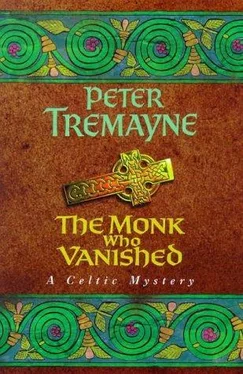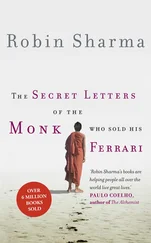Peter Tremayne - The Monk Who Vanished
Здесь есть возможность читать онлайн «Peter Tremayne - The Monk Who Vanished» весь текст электронной книги совершенно бесплатно (целиком полную версию без сокращений). В некоторых случаях можно слушать аудио, скачать через торрент в формате fb2 и присутствует краткое содержание. Жанр: Исторический детектив, на английском языке. Описание произведения, (предисловие) а так же отзывы посетителей доступны на портале библиотеки ЛибКат.
- Название:The Monk Who Vanished
- Автор:
- Жанр:
- Год:неизвестен
- ISBN:нет данных
- Рейтинг книги:3 / 5. Голосов: 1
-
Избранное:Добавить в избранное
- Отзывы:
-
Ваша оценка:
- 60
- 1
- 2
- 3
- 4
- 5
The Monk Who Vanished: краткое содержание, описание и аннотация
Предлагаем к чтению аннотацию, описание, краткое содержание или предисловие (зависит от того, что написал сам автор книги «The Monk Who Vanished»). Если вы не нашли необходимую информацию о книге — напишите в комментариях, мы постараемся отыскать её.
The Monk Who Vanished — читать онлайн бесплатно полную книгу (весь текст) целиком
Ниже представлен текст книги, разбитый по страницам. Система сохранения места последней прочитанной страницы, позволяет с удобством читать онлайн бесплатно книгу «The Monk Who Vanished», без необходимости каждый раз заново искать на чём Вы остановились. Поставьте закладку, и сможете в любой момент перейти на страницу, на которой закончили чтение.
Интервал:
Закладка:
The Brehons Dathal and Fachtna leant close to Rumann and all three judges held a whispered conversation. Then Rumann addressed her: ‘Your request is unusual; nevertheless, as this matter hinges on the peace of this kingdom, we will grant you some licence to present your arguments.’
Fidelma sighed with relief. ‘This has been no ordinary case. Indeed, I was confused for some time by another matter which I thought was pertinent to its resolution but which was no more than a series of unrelated events crossing the path of one of the most horrendous plots to destroy the kingdom of Muman.’
There was a clamour among the people and Rumann banged his gavel several times.
Solam was on his feet again. ‘Is she now saying that we plotted to destroy Colgu’s kingdom?’ he snapped. ‘I am at a loss, for she seems to be saying one thing one moment and another the next moment!’
Fidelma held up both hands. ‘Learned judges, there is no short route to the truth other than to allow me the time to explain in my way.’
‘You have been given that licence,’ Rumann confirmed. ‘There must be no further interruptions until the counsel for Cashel has done.’
Solam returned reluctantly to his seat.
‘Very well,’ said Fidelma. ‘I do not have to explain that there are tensions between Muman and the northern kingdom of Ulaidh. The Uí Néill and the Eóghanacht have been in disagreement since this land was first divided between them, that time almost beyond time when Eremon ruled in the north and Eber Fionn ruled in the south. The descendant of Eremon, the Uí Néill, like Eremon himself, believe they should rule all five-fifths of Eireann. That has been, and is, the cause of the tensions in this land. Even now, when we have left our pagan past behind, the chiefs of the Faith have divided on those political lines. The Comarb of Patrick in Armagh supports his King, the Uí Néill; while here in Muman, the Comarb of Ailbe gives allegiance to the Eóghanacht.’
‘History!’ sneered Solam, almost under his breath. ‘Is our time to be wasted with history? What need do we have of such obscurity?’
Fidelma wheeled angrily on him. ‘Without history we would becondemned to remain children, not knowing who we are nor where we come from. Without knowing the past, we cannot hope to understand the present, and not understanding the present, we cannot shape a better future.’ She turned back to the judges. ‘Learned judges, remember those historic tensions, for they are important.’
She paused a moment. There was now no sound. Everyone recalled the friction and jealousies that she had outlined. Not least the Uí Fidgente, who had several times been supported in their attempts against Cashel by ambitious Uf Néill monarchs.
‘I will now turn to the specifics. Let me start by saying that there is a young Prince in the kingdom of Muman who is possessed of a burning ambition. He seeks power and to achieve power he is not concerned with law nor morality.’
‘Name him!’ came an immediate cry from several people.
‘Name him I shall,’ replied Fidelma calmly. ‘But in due course. This young man, in the pursuit of power, decided to bring Muman down so that he could step into the power void. Muman is a large and strong kingdom. But where is the weakness of Muman?’
She turned to Donennach, the Prince of the Uí Fidgente. He flushed and scowled.
‘It is known that the Uí Fidgente have long claimed that they should sit in power in Cashel,’ she said.
‘I do not deny it,’ Donennach replied defiantly. ‘It is history. As you have so eloquently emphasised — it is history.’
‘Just so,’ smiled Fidelma. ‘The Eóghanacht have fought many battles with the Uí Fidgente over the centuries. The spoils have always been Cashel. Now this young man, whom, I should now tell you, is a Prince in this land, devised a cunning plot to create dissensions in Muman. He would organise an assassination. An assassination of the King of Cashel. The attempted assassination of the Prince of the Uí Fidgente was a blind to the real purpose …’
She had to pause because the uproar became deafening. Both Solam and Donennach were on their feet shouting while the Uf Fidgente warriors led by Gionga were standing stamping their feet on the ground to show disapproval. In the great halls, during feasting or during a trial, no one was allowed in without leaving their weapons outside. Eadulf, following the drama being enacted before him, knew that had Gionga and his men had weapons in their hands, there would have been serious trouble.
The Brehon Rumann fought for control and by the sheer weight of his personality succeeded in restoring order. He was about to speak but Fidelma resumed her summary.
‘This prince, to encompass his plan, and knowing that the UfFidgente would come to Cashel on a certain day, sent a trusted messenger to the Uí Néill of Ailech to reveal his plan and ask that equally ambitious King for assistance. That assistance was forthcoming. There was a Brother Baoill at Armagh who shared the belief that the Uí Néill and Armagh should dominate the five kingdoms. It so happened that, by a curious coincidence, Baoill was the twin brother of Brother Mochta, the Keeper of the Holy Relics of Ailbe.
‘At this stage the plan became intricate. The idea was not merely to assassinate the King of Muman but to throw Muman into complete chaos by attempting to steal and hide the Holy Relics of Ailbe. There is little need for me to explain that the Relics are not just a priceless icon but the political symbol of the entire kingdom of Muman. Ailbe was our spiritual guardian. The disappearance of his Relics would cause great alarm and despair among us. Just think of that combination! The death of our King, the loss of the Relics.
‘Even so, the conspirators were not contented. In case of failure, the Uí Néill of Ailech sent a band of his men into this kingdom. It is not the first time that this has happened. It was that band of mercenaries who attacked Imleach and cut down the sacred yew-tree.’
The Brehon Dathal learnt forward. ‘Yet the boar rampant, symbol of the Uí Fidgente, was carved on that tree by the raiders.’
‘In order that the Uí Fidgente might be blamed. I began to suspect as much when I saw that the raider we had captured, and who was, unfortunately killed, carried a sword that I had seen in my travels north. This was a claideb dét , a sword decorated with animal teeth. It took me some time to remember that it is only made in the territory of Clan Brasil. The same style of sword was carried by Baoill during the assassination attempt. Armagh lies in the territory of Clan Brasil.’
Solam had turned to her in astonishment as he began to see what she was driving at. ‘Then are you saying that the Uí Fidgente are an innocent party in all this? That you are not seeking to blame Donennach and claim he was a conspirator?’
She smiled swiftly. ‘I am afraid the actions of the Uí Fidgente were not helpful in supporting their innocence from the time Gionga blocked the bridge over the Suir with his warriors. But that action was not the only thing which misled me. What misled me for a while were events that were almost wholly unconnected.’
‘Which were?’ demanded Solam, now relaxing back in his seat.
‘The involvement of Samradán in this matter. I will return to this in a moment. Let us continue with the main story. The ambitious young Prince now awaited help from Ailech. His messenger to Ailech was the man we know as the archer, Saigteóir. To Armagh, and to the Comarb of Patrick, he set Samradan. The archer was, of course,the man who tried to assassinate Colgú. What his real name was is only known to the chief conspirator. It was this chief conspirator, the ambitious young rigdomna, who gave the archer the emblem of the Golden Chain with instructions to leave it when he escaped after the assassination.
Читать дальшеИнтервал:
Закладка:
Похожие книги на «The Monk Who Vanished»
Представляем Вашему вниманию похожие книги на «The Monk Who Vanished» списком для выбора. Мы отобрали схожую по названию и смыслу литературу в надежде предоставить читателям больше вариантов отыскать новые, интересные, ещё непрочитанные произведения.
Обсуждение, отзывы о книге «The Monk Who Vanished» и просто собственные мнения читателей. Оставьте ваши комментарии, напишите, что Вы думаете о произведении, его смысле или главных героях. Укажите что конкретно понравилось, а что нет, и почему Вы так считаете.












